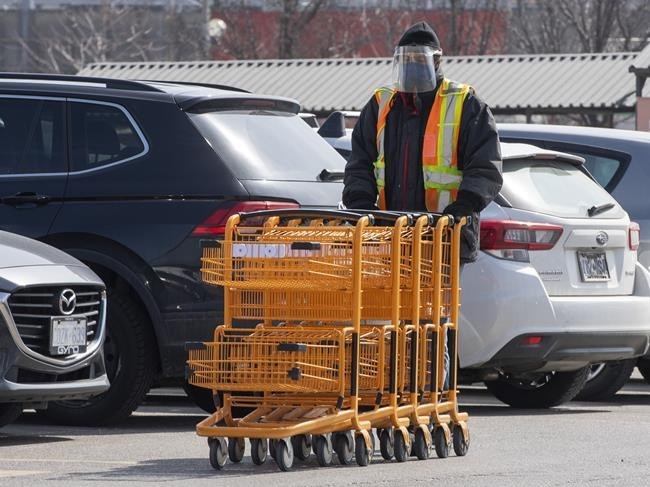Some essential workers fear the latest "shutdown" Premier Doug Ford is imposing on Ontario will do little to protect them from COVID-19.
The measures announced Thursday shutter personal care services and restaurant dining rooms across the province, but allow other essential and non-essential businesses to operate with tighter capacity limits and requires schools to stay open.
Some retail workers worry the latest round of public health rules don't go far enough to discourage customers from shopping en masse.
Essential retail stores are capped at 50 per cent of their maximum capacity and non-essential stores are limited to 25 per cent.
But 25-year-old Meghan Ghent, who works at a high-end department store in Toronto, says that measure has been in place in the city since it rejoined the grey-lockdown zone a month ago.
She says some days, foot traffic is at what feels like "pre-pandemic levels."
And she notes that she's not able to work behind a plexiglass barrier or maintain the recommended two-metres of physical distance from customers and staff.
"I don’t feel safe continuing to work non-essential retail in a third wave," Ghent said. "Even with the extremely strict precautions I myself take, just based on the number of people we have to interact with in an enclosed space -- some not wearing masks properly or even at all -- I do not feel safe."
Ford's shutdown, one step above the grey-lockdown level of the province's pandemic response framework, comes into effect first thing Saturday and will last for at least four weeks.
The premier said he was loath to take the step, but called it necessary to control the spread of more contagious variants of COVID-19 that are fuelling the pandemic's third wave despite an accelerating vaccine rollout.
His government stopped short of imposing a stay-at-home order like the one introduced in January, which closed non-essential retailers and only allowed people to leave their homes for essential trips.
"We're not going to be producing a stay-at-home order, because we saw the last time that it had tremendous ill effect on both children and adults," Health Minister Christine Elliott said on Thursday. "...We of course have to balance any measures that we take with people's mental health as well."
But while the stay-at-home order may not have been well received, it did seem to stop people from coming into the big-box drugstore where 22-year-old Odessa Ordanza works as a cashier in Mississauga, Ont.
She said customers have resumed that habit since the order lifted in Peel Region less than a month ago -- sometimes without masks on -- and she hopes this shutdown will send the message that it's time to stop.
"It’s still kind of scary going to work because the virus is still there, but since we're essential, we still have to open," Ordanza said. "Knowing that non-essential stores need to open kind of makes me anxious."
Workers' concerns extend beyond the retail sector, said Doris Grinspun of the Registered Nurses' Association of Ontario.
She said the government should have introduced paid sick days along with its latest batch of restrictions, noting such a move would mean essential workers won't have to choose between paying their bills and keeping their workplaces safe.
"It is obvious that workplace outbreaks account in large part for the increase in case counts and yet, there is still no provision for what should be a central public health measure in the fight against this virus -- paid sick days," Grinspun said.
Rather than introducing that measure, the province has encouraged people to get tested for COVID-19 so they can apply for federal benefits if the virus forces them to stay home.
This report by The Canadian Press was first published April 2, 2021.
This story was produced with the financial assistance of the Facebook and Canadian Press News Fellowship
Denise Paglinawan and Nicole Thompson, The Canadian Press




